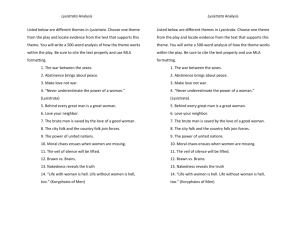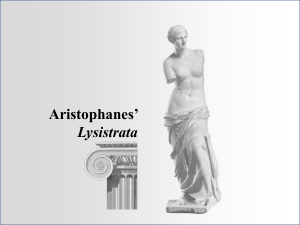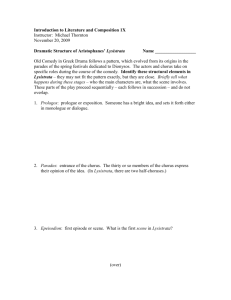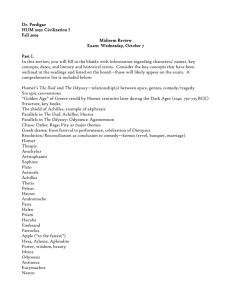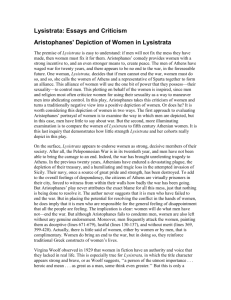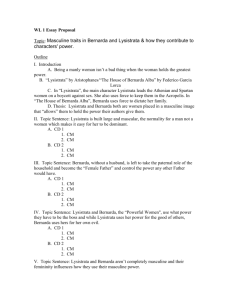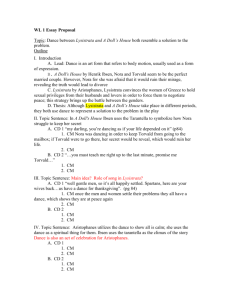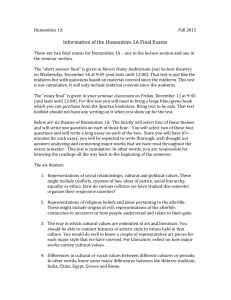Lysistrata - Hackett Publishing Company
advertisement
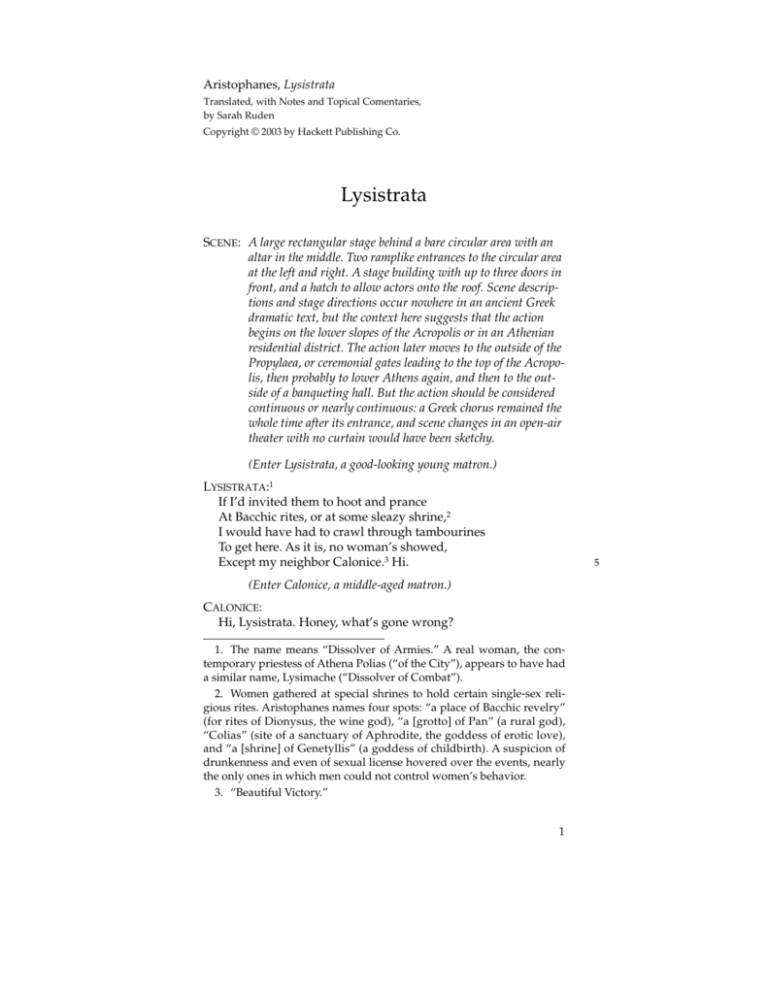
Aristophanes, Lysistrata Translated, with Notes and Topical Comentaries, by Sarah Ruden Copyright © 2003 by Hackett Publishing Co. Lysistrata SCENE: A large rectangular stage behind a bare circular area with an altar in the middle. Two ramplike entrances to the circular area at the left and right. A stage building with up to three doors in front, and a hatch to allow actors onto the roof. Scene descriptions and stage directions occur nowhere in an ancient Greek dramatic text, but the context here suggests that the action begins on the lower slopes of the Acropolis or in an Athenian residential district. The action later moves to the outside of the Propylaea, or ceremonial gates leading to the top of the Acropolis, then probably to lower Athens again, and then to the outside of a banqueting hall. But the action should be considered continuous or nearly continuous: a Greek chorus remained the whole time after its entrance, and scene changes in an open-air theater with no curtain would have been sketchy. (Enter Lysistrata, a good-looking young matron.) 5 LYSISTRATA:1 If I’d invited them to hoot and prance At Bacchic rites, or at some sleazy shrine,2 I would have had to crawl through tambourines To get here. As it is, no woman’s showed, Except my neighbor Calonice.3 Hi. 5 (Enter Calonice, a middle-aged matron.) CALONICE: Hi, Lysistrata. Honey, what’s gone wrong? 1. The name means “Dissolver of Armies.” A real woman, the contemporary priestess of Athena Polias (“of the City”), appears to have had a similar name, Lysimache (“Dissolver of Combat”). 2. Women gathered at special shrines to hold certain single-sex religious rites. Aristophanes names four spots: “a place of Bacchic revelry” (for rites of Dionysus, the wine god), “a [grotto] of Pan” (a rural god), “Colias” (site of a sanctuary of Aphrodite, the goddess of erotic love), and “a [shrine] of Genetyllis” (a goddess of childbirth). A suspicion of drunkenness and even of sexual license hovered over the events, nearly the only ones in which men could not control women’s behavior. 3. “Beautiful Victory.” 1 2 Aristophanes Don’t spoil your pretty face with ratty snarls! Your eyebrows look like bows to shoot me dead. 10 LYSISTRATA: Oh, Calonice, this just burns me up. Women are slacking off, can’t make the grade. Our husbands say we’re cunning to the point Of—well—depravity. 10 CALONICE: Darn tootin’ right! LYSISTRATA: But given word to meet me here today— A vital matter needs our serious thought— They’re sleeping in. CALONICE: 15 20 But sweetie, soon they’ll come. Sometimes it’s quite a challenge sneaking out. The husband might require some straightening up, The maid a screech to get her out of bed, The kid a bath, a nibble, or a nap. LYSISTRATA: But what I have to say means more than that To women. 15 20 CALONICE: Precious, what is eating you? Why summon us in this mysterious way? What is it? Is it . . . big? LYSISTRATA: Of course. CALONICE: And hard? LYSISTRATA: Count on it. CALONICE: Then how could they not have come? 25 LYSISTRATA: Oh, shut your mouth. They would have flocked for that. 25 Lysistrata 3 No, this thing I’ve gone through exhaustively; I’ve worked it over, chewed it late at night. CALONICE: Pathetic if it needed that much help. 30 LYSISTRATA: It’s this pathetic: in the women’s hands Is the salvation of the whole of Greece. 30 CALONICE: In women’s hands? It’s hanging by a thread. LYSISTRATA: We hold within our grasp the city’s plight. The Peloponnesians may be wiped out— CALONICE: By Zeus, that’s best, as far as we’re concerned— 35 LYSISTRATA: And the Boeotians with them, root and branch—4 35 CALONICE: All of them, fine, except those gorgeous eels.5 40 45 LYSISTRATA: I won’t say Athens, since the omen’s bad. Imagine if I’d said it—shocking, huh? If all the women come together here— Boeotians, Peloponnesians, and the rest— And us—together we can salvage Greece. CALONICE: What thoughtful thing could women ever do? What vivid venture? We just sit decked out In saffron gowns, makeup about this thick, Cimberian6 lingerie, and platform shoes. 4. The Peloponnesians and the Boeotians were the chief enemies of Athens during the Peloponnesian War. 5. The eels from Lake Copaïs were a culinary export sorely missed during the war, when trade restrictions were in force. 6. May refer to the Crimean region; in any case, the clothing is exotic. 40 45 4 Aristophanes LYSISTRATA: It’s those that I intend to save our race: Those dresses, and perfume, and rouge, and shoes, And little see-through numbers that we wear. CALONICE: How’s that? LYSISTRATA: 50 The men surviving won’t lift up Their spears (against each other, anyway). 50 CALONICE: By the Two Gods,7 I’ve got a dress to dye! LYSISTRATA: Or shields— CALONICE: I’ve got a negligée to try! LYSISTRATA: Or knives— CALONICE: Ooh, ooh, and shoes! And shoes to buy! LYSISTRATA: So shouldn’t all the other women come? 55 CALONICE: Well, YES! With wings to boost them, hours ago! LYSISTRATA: It’s such a bitch assembling Attica.8 You know they’d rather die than be on time. Nobody even came here from the coast, Or out of Salamis.9 7. Demeter and Kore. 8. The whole region of Attica, not the city of Athens alone, was the relevant political unit, with rural dwellers having equal rights. Political assemblies in Athens encompassed all of the demes, or administrative areas. 9. Key strategic areas, with special political significance. See also line 411 and note. 55 Lysistrata 5 CALONICE: 60 I’m sure they got Up on those mounts of theirs10 at break of day. 60 LYSISTRATA: I thought it would be only logical For the Acharnians to start the crowd,11 But they’re not here yet. CALONICE: 65 Well, Theogenes’ wife Has raised her glass to us—any excuse.12 No, wait. Look thataway: here come a few, LYSISTRATA: And now a couple more. (Several women straggle in, among them Myrrhine, a young and beautiful matron.) CALONICE: Yuck, what a smell! Where are they from? LYSISTRATA: The puke-bush swamp. CALONICE: By Zeus, It must be quite a place to raise a stink.13 10. Literally, “straddled the yachts” or “mounted astride horses,” with a joke on a sexual position with the woman on top. 11. The deme of Acharnae had been repeatedly and particularly badly ravaged by the invading Spartan army earlier in the war, while its inhabitants stayed in Athens for safety. In Aristophanes’ play Acharnians, the chorus is a group of old men from this deme, first opposing peace but then won over. 12. A puzzling pair of lines. This Theogenes has not been firmly identified. His wife either “consulted [the goddess] Hecate” about coming, or “lifted her sail/wine cup.” 13. The deme of Anagyrus was swampy and full of a malodorous bush that gave its name to the place. “To shake the anagyros” meant to cause trouble. 65 6 Aristophanes MYRRHINE:14 Ooh, Lysistrata, are we very late? Too mad to say? LYSISTRATA: 70 Why should I not be mad? This is important! Why not come on time? 70 MYRRHINE: Well, it was dark—I couldn’t find my thing—15 But say what’s on your mind, now that we’re here. 75 LYSISTRATA: No, wait a little while. The other wives, The Boeotians and the Peloponnesians, Are on the way. 75 MYRRHINE: All right, of course we’ll wait. Look over there, though—that’s not Lampito16? (Enter Lampito, a strapping woman in a distinct, more revealing costume. Several others in various foreign dress accompany her, including a Boeotian and a Corinthian Woman.) 80 LYSISTRATA: Darling Laconian, Lampito, hail! How I admire your gleaming gorgeousness, Your radiant skin, your body sleek and plump. I bet that you could choke a bull.17 LAMPITO: I could. I’m in such shape I kick my own sweet ass.18 14. Probably something like “Bearded Clam.” 15. Literally, “little belt,” possibly an undergarment. 16. From the word for “shining,” or “light.” 17. Spartan women were more active than their counterparts in Athens and even exercised in public. Their health must indeed have been better than that of women mostly confined to their homes. 18. A Spartan dance involved jumping and slapping one’s own soles against the buttocks. 80 Lysistrata 7 CALONICE: (Prodding curiously.) And what a brace of boobs. How bountiful! LAMPITO: What am I s’pposed to be? A pig for sale?19 85 LYSISTRATA: And what’s this other young thing’s origin? 85 LAMPITO: Boeotia sent her as a delegate. She’s at your service. MYRRHINE: (Peeking under woman’s clothes.) Boeotian—sure enough: Just look at what a broad and fertile plain. CALONICE: (Peeking likewise.) She’s even pulled the weeds.20 Now that is class. LYSISTRATA: And what’s the other girl? LAMPITO: Corinthian. 90 Hell, ain’t she fine? LYSISTRATA: Damn right she’s fine . . . from here, And get another angle on her—wow! LAMPITO: We’re like a women’s army. Who put out The word to assemble? LYSISTRATA: That was me. LAMPITO: How come? Tell us what’s going on. 19. Literally, “You finger me like a sacrificial victim.” An animal offered to a god had to be a perfect specimen. 20. “Pennyroyal,” a characteristic Boeotian plant, could also mean “pubic hair.” Careful female grooming included plucking or burning pubic hair into some tidy shape. 90 8 Aristophanes CALONICE: 95 Yeah, honey, what? What all-important burr is up your butt? 95 LYSISTRATA: The time has come. But first you answer me One weensy little thing. CALONICE: Okay. Just ask. 100 LYSISTRATA: I know you all have husbands far from home On active service. Don’t you miss the men, The fathers of your children, all this time? 100 CALONICE: My husband’s been away five months in Thrace. Somebody’s gotta watch the general.21 MYRRHINE: Mine’s been in Pylos22 seven freaking months. 105 110 LAMPITO: Once in a while, mine’s back, but then he’s off. It’s like that shield’s a friggin’ pair of wings. LYSISTRATA: And since the Milesians deserted us23 (Along with every scrap of lover here), We’ve even lost those six-inch substitutes, Those dinky dildos for emergencies. If I could find a way to end this war, Would you be willing partners? 21. “Guarding Eucrates,” probably the brother of the general Nicias, who had played a dismal role in the Sicilian expedition. Nothing further about Eucrates’ circumstances is known. 22. A fortified coastal city in the Peloponnese, which Athens had occupied since 425 B.C.E. 23. Miletus revolted from the Delian League, or Athenian empire, in 412 B.C.E., the year before the first production of Lysistrata. Dildos were apparently one of Miletus’ exports. 105 110 Lysistrata 9 CALONICE: I sure would. I’d sacrifice my nicest dress to buy Some wine (and sacrifice the wine to me). 115 MYRRHINE: I’d cut myself in two and donate half— A flat slice like a bottom-feeding fish. 115 LAMPITO: I’d hike clear up Mount Taygetus24 to see If peace is flashin’ somewhere way far off. 120 LYSISTRATA: Fine. So. Here goes. You need to know the plan. Yes, ladies. How we force the men to peace. How are we going to do it? We must all Hold off— 120 CALONICE: From what? LYSISTRATA: You’re positive you will? CALONICE: We’ll do it! Even if it costs our lives. LYSISTRATA: From now on, no more penises for you. (The women begin to disperse.) 125 Wait! You can’t all just turn and walk away! And what’s this purse-lipped shaking of your heads? You’re turning pale—is that a tear I see? Will you or not? You can’t hold out on me! 125 CALONICE: No, I don’t think so. Let the war go on. 130 MYRRHINE: Me? Not a chance in hell, so screw the war. 24. Near Sparta. 130 10 Aristophanes LYSISTRATA: That’s it, my piscine heroine? You said Just now that you’d bisect yourself for peace. 135 CALONICE: ANYTHING else for me. I’d walk through fire, But do without a dick? Be serious! There’s nothing, Lysistrata, like a dick. 135 LYSISTRATA: (Turning to Woman #1.) And you? WOMAN #1: Me? Mmm, I’ll take the fire, thanks. LYSISTRATA: Oh, gender fit for boning up the butt!25 No wonder we’re the stuff of tragedies: Some guy, a bit of nookie, and a brat.26 (To Lampito.) 140 But you, sweet foreigner, if you alone Stand with me, then we still could save the day. Give me your vote! 140 LAMPITO: Shit, it’s no easy thing To lie in bed alone without no dong . . . But count me in. Peace we just gotta have. 145 LYSISTRATA: The only woman in this half-assed horde! CALONICE: Suppose we did—the thing you say we should— Which gods forbid—what has that got to do With peace? 25. A nearly literal translation. Anal sex was associated with shamelessness. 26. Literally, “Poseidon and a skiff.” In a lost play of Sophocles, the heroine Tyro is seduced by the sea god Poseidon. Her twin sons, Pelias and Neleus, are set adrift in a small boat but rescued and eventually reunited with her. To order an examination copy of this book, please click here. 145
